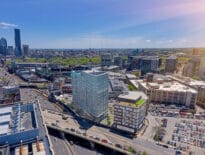
Alta Union House is one of several apartment complexes totaling 1,400 units to rise in downtown Framingham in recent years. Image courtesy of The Architectural Team
Framingham Mayor Yvonne Spicer has rejected an attempt by the City Council to freeze approval of new multifamily developments in the city.
City councilors cited concerns about understanding the impacts of new construction on schools and traffic when attempting to enact the moratorium. City staff said over 1,400 units of multifamily housing have been permitted in the city since 2015.
The city – then a town – had rezoned its downtown and its northern Nobscot neighborhood for transit-oriented development in 2015 after several years of community debate. The intent was to build a “live-work-play” core in both areas and generate more housing options for residents. Spicer called the veto, only her second in three years as mayor, an “extraordinary action.”
“[A]fter review and in-depth consultation with business and community leaders, I believe it will unreasonably impinge on the city’s growth and future economic opportunities, and I believe there are other less intrusive means to achieve” the goals espoused by the moratorium’s backers, Spicer wrote in a statement announcing her veto.
Spicer also echoed concerns voiced by business leaders that an enacted moratorium would generate a view that the city would be “not open” for business and could hurt working-class residents by delaying housing production.
“In the 1970s, Framingham imposed a similar moratorium with negative results. The 1970s moratorium exacerbated the impacts of the economic downturn the town was experiencing at the time and sent a message to developers that they weren’t welcome here. Framingham has worked for many years to dispel its ‘anti-business’ reputation,” Spicer wrote. “As Framingham and MetroWest seek to absorb and ultimately rebound from the effects of the COVID-19 pandemic, now is not the time to impose a new moratorium that will once again send a clear signal that Framingham is not welcoming to meaningful economic development.”
In addition, Spicer cast doubt on concerns over increased school costs and traffic.
“The increased cost of student enrollment due to our new housing has been negligible. With respect to traffic, if we had adequate, affordable housing for people who work in Framingham, the need for people to commute to the city for employment would be reduced, alleviating the additional stress of traffic on the city,” she wrote.
Spicer’s decision comes as investors and developers have begun casting their eyes towards Greater Boston’s suburbs in search of multifamily development opportunities.




 |
| 

